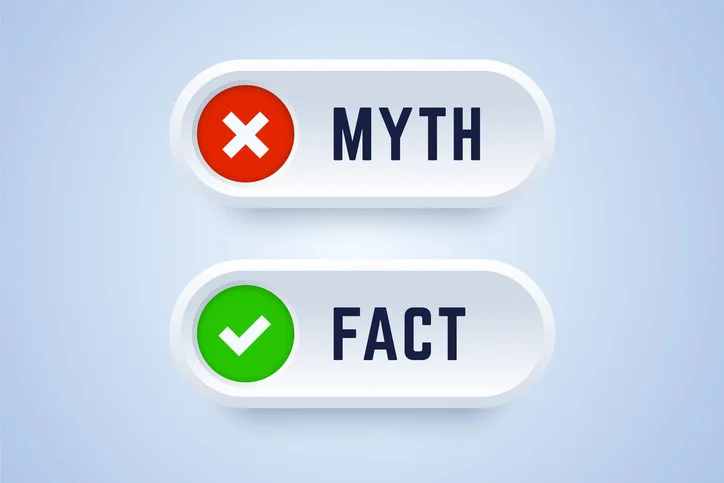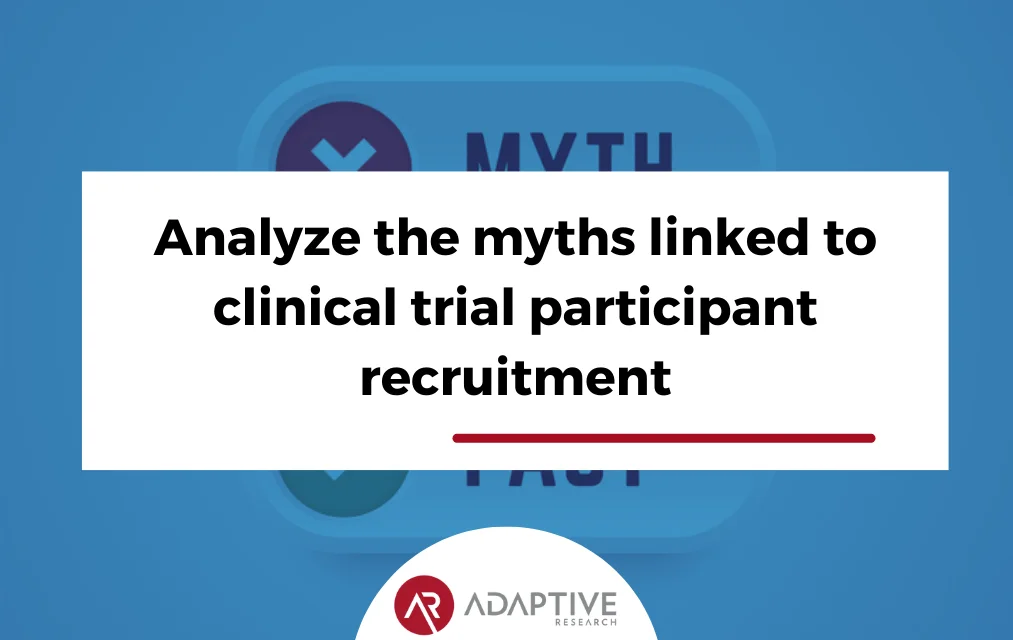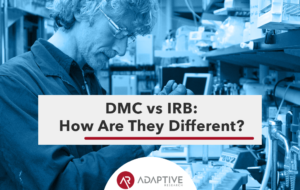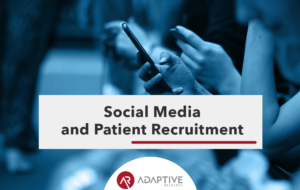Clinical trials help researchers to discover new and superior treatments for illnesses and their side effects. One of the biggest barriers to patient participation is widespread myths about being in a clinical trial. Those involved with research can play an essential role in clearing up these myths by addressing them directly in recruitment materials and during initial conversations with potential participants.

What are myths?
They are widely held but false beliefs or ideas.
Myths surrounding clinical trial participant recruitment
Myth: I may be handled like a guinea pig.
Suggested message: This is not true. Instead, most clinical trial participants report that they were fully informed of all the outcomes of the clinical trials and were handled with dignity and respect. Most clinical trial participants feel that they were given extra attention and had more well-trained people observing them.
Typically, strict guidelines are crafted to ensure that all clinical trial participants are treated honestly and ethically. Before any investigational drug can be administered to humans, researchers must complete rigorous testing and screening.
Myth: After enrolling in a clinical trial, I won’t have the opportunity to change my mind.
Suggested message: Understand that you are forever in complete control of your treatment plan as a patient. If you choose to get out of the clinical trial participation, you can withdraw.
Myth: Clinical trials are dangerous as they use new medications and practices
Suggested message: Since clinical trials are conducted to get new solutions to health problems, research may involve some level of risk. However, clinical trial participants get investigational medicine only after such treatment has undergone extensive testing. The extensive testing indicates that the medication is likely to be safe and effective in human beings.
The utmost safety of all clinical trial participants is a priority for all researchers. Amidst the research, scientists constantly and extensively assess the medicine to ensure it is safe for all participants to continue with a particular clinical trial.
Myth: Participating in a clinical trial can’t help me in any way.
Suggested message: Note that once you choose to participate in a clinical trial, you have a rare chance to get an investigational drug, which is unavailable for other people outside of the clinical trial. Typically, the researchers closely watch over their trial participants. They may avail opportunities for additional tests, lab work, and clinic visits, which are intended to uphold the well-being of clinical trial participants. Participants who engage in clinical trials play a vital role in improving medical science, which helps more people in your country or community live longer and better lives.
Myth: Participating in clinical trials is for people having the time for long commitments
Suggested message: All clinical trials are different. Clinical trial studies require tests, procedures, clinic visits, and scans, and this may be so time-consuming for some people with tight schedules. But, in most cases, clinical trials don’t require much more than what would typically be performed when a patient is getting a standard treatment regimen.
Since the patient participation in a clinical trial is being closely monitored, the additional visits, labs, and scans assist the trial doctors and study nurses in monitoring their clinical trial participants more frequently and addressing any shortcomings right away.
The study doctor and nurse thoroughly explain all the obligations and time commitments necessary to conduct the clinical trial to the trial participant before any consent forms are fully signed.
Myth: Participating in a clinical trial will expose all my personal health information
Suggested message: Sharing specific clinical information helps physicians, patients, and health care personnel to make well-informed treatment decisions. Whereas sharing this information and data is vital, safeguarding the privacy of all clinical trial participants and ensuring that data is shared duly is of great importance.
Usually, different safety measures are used to ensure that all your private information is protected. Before consent, clinical trial participants are informed of the particular health information that will be collected and how it will be used, shared, and protected.
Myth: Doctors who participate in clinical trials are highly interested in conducting experiments than in their patients.
Suggested message: This is not the case as most clinical trials are carefully regulated in terms of clinical procedures, documentation, and work ethic. Some doctors research without receiving monetary rewards but only because they enjoy what they do. The clinical trial participants’ interests are of high priority at all times.
Myth: Clinical research is funded by companies that manipulate the results.
Suggested message: Almost all clinical trials are carefully regulated by the health authorities in the country to ensure that the results are beneficial to the health needs of society.
Myth: Clinical trials are characterized by painful or unpleasant aspects to people.
Suggested message: Like all medical interventions, clinical trials have possible benefits and risks, including pain or side effects. Processes and procedures vary for every clinical trial. Some methods and techniques, such as those in general medical care, may be unpleasant or risky. However, the doctor in charge will inform you about what to expect. The processes and risks will be indicated in the informed consent document for you to look into before deciding whether to participate in the clinical trials or not.

Myth: Some people who attempt to volunteer in a clinical trial are told by the research team that they aren’t eligible to perform in the clinical trial. The entire process seems unfair.
Suggested message: Each clinical trial has a protocol, which is a plan that explains what will be conducted during the clinical trial, how the trial will be conducted, and why every part of the trial is necessary.
The protocol for the clinical trial includes eligibility criteria which include guidelines stipulating who can and can’t participate in the clinical trial. The typical eligibility criteria include age group, gender, having a particular cancer type or cancer stage, having received or not received certain medicines in the past, a participant’s medical history, and present health condition.
It’s important to understand that eligibility criteria are not utilized to reject you on a personal level as they are basic guidelines used to identify people most likely to benefit from the clinical trial. The criteria are beneficial to ensure that researchers will ably answer questions regarding the investigational medicine which they intend to research.
Conclusion
Physicians, clinics, or patient advocacy organizations should inform potential clinical trial participants about all the facts regarding clinical trials to help eliminate myths surrounding clinical trials. Clinical trial participants should be informed that each clinical trial has a protocol, which is a plan that explains what will be conducted during the clinical trial, how the trial will be conducted, and why every part of the trial is necessary. The study doctor and nurse should thoroughly explain all the obligations and time commitments necessary to conduct the clinical trial to the trial participants before any consent forms are fully signed.
Sources
https://catalyst.phrma.org/debunking-common-myths-about-clinical-trials?hs_amp=true
https://www.thompsoncancer.com/clinical-trials-myths/
https://www.antidote.me/blog/how-to-address-barriers-to-clinical-trial-patient-recruitment






